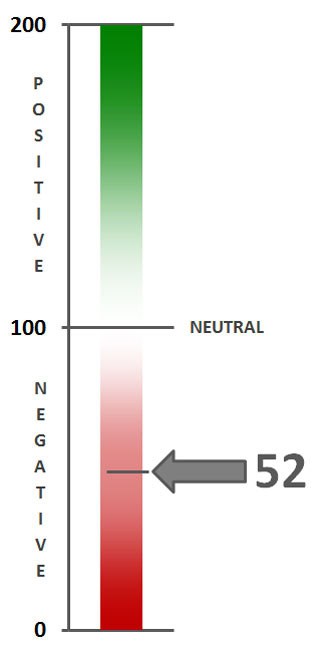PGPF Launches New "Fiscal Confidence Index" To Measure Public Opinion About America’s National Debt
As Nation Approaches Fiscal Cliff, the Benchmark December 2012 Fiscal Confidence Index, Modeled after the Consumer Confidence Index, is 52 (100 is Neutral), Indicating Strongly Negative Public Sentiment
Survey Finds 79% of Respondents Concerned About the Fiscal Cliff
NEW YORK — The Peter G. Peterson Foundation today released the first edition of the Fiscal Confidence Index, a new, monthly measure of public attitudes about the nation’s long-term debt and the efforts elected leaders are making to address the debt.
The benchmark December 2012 Fiscal Confidence Index, modeled after the Consumer Confidence Index, is 52 (100 is neutral), indicating strongly negative public sentiment about America’s fiscal situation and an urgency for more effective action to deal with the debt.
The Fiscal Confidence Index measures public opinion about the national debt by asking six questions in three key areas:
- CONCERN: Level of concern and views about the direction of the national debt.
- PRIORITY: How high a priority addressing the debt should be for elected leaders.
- EXPECTATIONS: Expectations about whether the debt situation will get better or worse in the next few years.
The survey results from these three areas are weighted equally and averaged to produce the Fiscal Confidence Index value. The Fiscal Confidence Index, like the Consumer Confidence Index, is indexed on a scale of 0 to 200, with a neutral midpoint of 100. A reading above 100 indicates positive sentiment. A reading below 100 indicates negative sentiment.
“The Peterson Foundation is launching the Fiscal Confidence Index to provide a benchmark of public opinion about America’s fiscal health and progress toward a more fiscally responsible future,” said Michael A. Peterson, President of the Peter G. Peterson Foundation. “The Fiscal Confidence Index is an important indicator of the attitudes of the American people on fiscal issues.”
“As America edges closer to the fiscal cliff, the inaugural Fiscal Confidence Index makes clear that Americans have a sense of urgency about our long-term debt and want leaders to take action,” said Peter G. Peterson, Chairman of the Peterson Foundation. “America’s fiscal path is directly connected to the economic health and vitality of the country. The decisions we make over the next several months could impact American prosperity for a generation.”

Fiscal Confidence Index Key Data Points:
- The December 2012 Fiscal Confidence Index value is 52. A score of 100 is neutral. Values below 100 show negative sentiment, while values above 100 show positive sentiment.
- The current Fiscal Confidence Index score for CONCERN about the debt is 48, the score for debt as a PRIORITY that leaders must address is 12, and the score for EXPECTATIONS about progress on the debt over the next few years is 96. The Fiscal Confidence Index of 52 is the average of these three sub-category scores. These results indicate strong concern about the debt and very strong feeling that addressing debt should be a high priority, balanced by cautious optimism that the fiscal situation may improve over the coming years.
- For a description of the complete methodology, see Appendix below.
Strong Concern about the Fiscal Cliff
As negotiations to avoid the fiscal cliff reach a critical juncture, the Peterson Foundation also polled Americans on their concern about the fiscal cliff, personal willingness to make sacrifices to reduce the national debt, and the urgency of addressing long-term debt and improving the economy.
- 79% of respondents said they are concerned about the fiscal cliff.
- Among potential consequences of going over the fiscal cliff, 89% of respondents expressed concern that the economy could be sent back into a recession. 88% expressed concern that unemployment could climb back up over 9 percent by the end of 2013.
- Survey respondents expressed willingness to make personal contributions and sacrifices to address the nation’s long-term debt and deficits, with 88% saying they would be willing to do their part to reduce the national debt if other people also do their part.
- 85% of respondents said that the national debt is a major problem that the country needs to address now.
- 85% of respondents also said that reducing the federal debt over time will help the economy.
The Peter G. Peterson Foundation commissioned a poll by the Global Strategy Group to survey public opinion on the national debt. The nationwide poll included 1,003 U.S. registered voters, surveyed by telephone between November 26 and December 3, 2012. The poll has a margin of error of +/- 3.1%. The poll examined voters’ opinions on the national debt, political leadership, and America’s fiscal and economic health.
Detailed poll results can be found online at: www.pgpf.org/what-we-are-doing/education-and-awareness/fiscal-confidence-index
About the Peter G. Peterson Foundation
The Peter G. Peterson Foundation is a nonprofit, nonpartisan organization established by Pete Peterson — businessman, philanthropist, and former U.S. Secretary of Commerce. The Foundation is dedicated to increasing public awareness of the nature and urgency of key long-term fiscal challenges threatening America’s future and to accelerating action on them. To address these challenges successfully, we work to bring Americans together to find and implement sensible, long-term solutions that transcend age, party lines and ideological divides in order to achieve real results. To learn more, please visit www.PGPF.org.
APPENDIX: Fiscal Confidence Index Methodology and Questions
- The Fiscal Confidence Index will be released monthly by the Peter G. Peterson Foundation.
- The Fiscal Confidence Index value is based on six questions in three categories.
- As is done with the Consumer Confidence Index, the first step in calculating the Fiscal Confidence Index is determining the “Relative Value” for each question. This calculation is made by taking the positive response for each question and dividing it by the sum of the positive and negative responses. Each question was asked on a four-point scale, and answers were weighted according to intensity, with the strongest responses counting twice as much as the middle responses (“much” better or worse answers count twice as heavily as “somewhat” better or worse answers).
- The scores for the Concern, Priority, and Expectations categories are determined by averaging the scores derived from the two questions in each category.
- The Fiscal Confidence Index value is converted from the Relative Value to place it on a scale on which 100 indicates equal positive and negative sentiment, while values below 100 indicate negative sentiment and values above 100 indicate positive sentiment.
- The Peter G. Peterson Foundation commissioned a poll by the Global Strategy Group to survey public opinion on the national debt. The nationwide poll included 1,003 U.S. registered voters, surveyed by telephone between November 26 and December 3, 2012. The poll has a margin of error of +/- 3.1%. The poll examined voters’ opinions on the national debt, political leadership, and America’s fiscal and economic health.
- The questions are as follows:
| CONCERN (48) | ||
|---|---|---|
| Thinking about our national debt over the last few years, would you say your level of concern has increased or decreased? ◊ Is that a lot or just a little? |
Increased a lot | 51% |
| Increased a little | 25% | |
| Decreased a little | 7% | |
| Decreased a lot | 3% | |
| (No change) | 12% | |
| (Don’t Know/Refused) | 2% | |
| INCREASED (NET) | 77% | |
| DECREASED (NET) | 10% | |
| When it comes to addressing our national debt, would you say things in the United States are heading in the right direction or do you think things are off on the wrong track? ◊ Do you feel that way strongly or just somewhat? |
Right direction-Strongly | 17% |
| Right direction-Somewhat | 23% | |
| Wrong track-Somewhat | 14% | |
| Wrong track-Strongly | 36% | |
| (Neither/Mixed) | 5% | |
| (Don’t Know/Refused) | 5% | |
| RIGHT DIRECTION (NET) | 39% | |
| WRONG TRACK (NET) | 51% | |
| PRIORITY (12) | ||
|---|---|---|
| Some people say that addressing the national debt should be among the President and Congress’ top 3 priorities. Do you agree or disagree? ◊ Do you feel that way strongly or just somewhat? |
Strongly agree | 71% |
| Somewhat agree | 18% | |
| Somewhat disagree | 4% | |
| Strongly disagree | 4% | |
| (Don’t Know/Refused) | 4% | |
| AGREE (NET) | 89% | |
| DISAGREE (NET) | 7% | |
| And when it comes to our national debt, do you think it is an issue that the President and Congress should spend more time addressing or less time addressing? ◊ Would you say a lot (more or less) time or just a little? |
A lot more time | 66% |
| A little more time | 20% | |
| A little less time | 5% | |
| A lot less time | 1% | |
| (The same amount of time) | 4% | |
| (Don’t Know/Refused) | 3% | |
| MORE TIME (NET) | 87% | |
| LESS TIME (NET) | 7% | |
| EXPECTATIONS (96) | ||
|---|---|---|
| And thinking about our national debt over the next few years, do you expect the problem to get better or worse? ◊ Is that much (better or worse) or just somewhat (better or worse)? |
Much better | 14% |
| Somewhat better | 30% | |
| Somewhat worse | 16% | |
| Much worse | 31% | |
| (No change) | 2% | |
| (Don’t know/Refused) | 6% | |
| BETTER (NET) | 44% | |
| WORSE (NET) | 47% | |
| And when it comes to our national debt, are you optimistic or pessimistic that the United States will be able to make progress on our national debt over the next few years? ◊ Would you say you are very (optimistic or pessimistic) or just somewhat? |
Very optimistic | 23% |
| Somewhat optimistic | 32% | |
| Somewhat pessimistic | 13% | |
| Very pessimistic | 26% | |
| (Neither/Mixed) | 2% | |
| (Don’t Know/Refused) | 3% | |
| OPTIMISTIC (NET) | 55% | |
| PESSIMISTIC (NET) | 40% | |
Further Reading
How Much Do We Spend on the Federal Workforce?
Here, we examine the federal government’s expenditure on its workforce, the evolution of its size over time, and the opportunities for budget savings.
What Are Interest Costs on the National Debt?
Interest costs are on track to become the largest category of spending in the federal budget.
The One Big Beautiful Bill Act Is the Most Expensive Reconciliation Package in Recent History
The legislative package will be the most expensive reconciliation bill in a quarter of a century and will add trillions of dollars to the U.S. debt.


